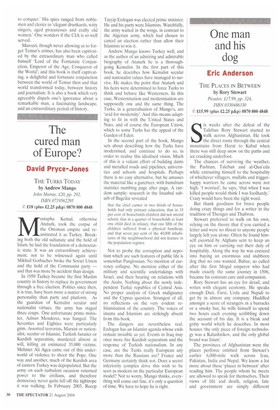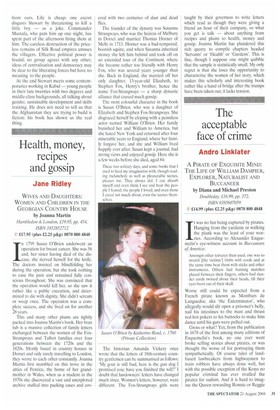One man and his dog
Eric Anderson
THE PLACES IN BETWEEN by Rory Stewart Picador, £17.99, pp. 324, ISBN 0330486330 £15.99 (plus 12.25 p&p) 0870 800 4848 Six weeks after the defeat of the Taleban Rory Stewart started to walk across Afghanistan. He took the direct route through the central mountains from Herat to Kabul when there was still deep snow on the paths and ice cracking underfoot.
The chances of surviving the weather, the Pashtun, Taleban and al-Oua'eda while entrusting himself to the hospitality of whichever villagers, mullahs and triggerhappy warriors he came across were not high. 'I worried', he says, 'that when I was killed people would think I was foolhardy.' Crazy would have been the right word.
But thank goodness for brave people doing crazy things and for a writer in the tradition of Thesiger and Thubron.
Stewart preferred to walk on his own, relying on the theory that if you carried a letter and were no threat to anyone people largely left you alone. Often he found himself escorted by Afghans sent to keep an eye on him or carrying out their duty of hospitality. Along the way he was coerced into buying an enormous and stubborn dog that no one wanted. Babur, so called after the first Mogul emperor who had made exactly the same journey in 1506, became his constant care and companion.
Rory Stewart has an eye for detail, and writes with elegant economy. He speaks enough Dad, Farsi, Urdu and Nepali to get by in almost any company. Huddled amongst a score of strangers in a barracks or a smoky hut, he wills himself to spend two hours each evening scribbling down the account of his day. It is a bleak and gritty world which he describes. In most houses 'the only piece of foreign technology was a Kalashnikov, and the only global brand was Islam'.
The provinces of Afghanistan were the places perforce omitted from Stewart's earlier 6,000-mile walk across Iran, Pakistan, India and Nepal. We know a lot more about these 'places in between' after reading him. The people whom he meets are allowed to speak for themselves. Their views of life and death, religion, fate and government are simply different from ours. Life is cheap: one escort disgusts Stewart by threatening to kill a little boy — as a joke. Commander Mustafa, who puts him up one night, has spent part of the afternoon firing shots at him. The careless destruction of the priceless remains of Silk Road empires amuses the villagers. Effective political power is feudal; no group agrees with any other; ideas of centralisation and democracy may be dear to the liberating forces but have no meaning to the people. At the end Stewart meets some contemporaries working in Kabul — young people in their late twenties with two degrees and middle-class backgrounds, all talking about gender, sustainable development and skills training. He does not need to tell us that the Afghanistan they are trying to build is fiction: his book has shown us the real thing.



























































 Previous page
Previous page